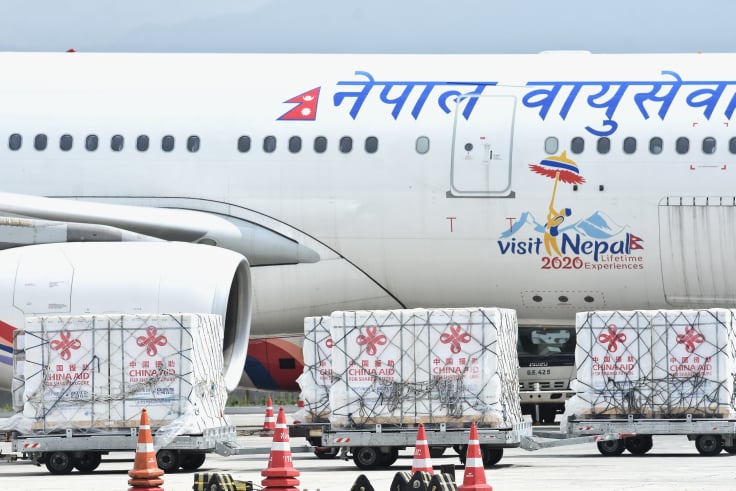As Covid-19 crests, Nepal eases restrictions



Amidst signs that the second Covid-19 wave is cresting in Nepal, the government is easing some restrictions in Kathmandu Valley, allowing limited international flights, while its efforts to procure more vaccines from abroad have not been successful.
The numbers needing hospitalisation drops, and with an airlift of oxygen and other medical supplies from abroad continuing, reports from district hospitals and Kathmandu show that medical oxygen shortage is not as acute as it was throughout May.
The Ministry of Health announced in its daily briefing on Wednesday that there were 5,316 new confirmed Covid-19 cases with 7,219 recovering. This brings the total number of active cases to 101,993, with most isolating at home. Of the 1,446 in hospital ICUs, 385 need ventilator support.
The official daily death toll has continued to fall, with 101 in the last 24 hours, down from a peak of more than 200 daily in mid-May. Even so, some hospitals in Kathmandu are still full as patients needing critical care are being brought in from outlying districts. The virus has now seeped into the remotest settlements in Nepal’s mountains.
Meanwhile, the district administrations of Kathmandu, Lalitpur and Bhaktapur decided to ease from 3 June strict restrictions that had closed down even corner grocery stores in the Valley. From Thursday, food stores can open till 9AM again, and construction sites will be allowed to operate. But public transport and other offices will remain shut. The lockdown that began on 29 April will now be extended till at least 14 June.
Out of Nepal’s 77 districts, only two are not in lockdown: Khotang in the east and Manang in the central trans-Himalaya. Most intercity buses are off the roads, with only ambulances, food and fuel trucks allowed on the highways.



International and domestic flights have been grounded now for a month, with only incoming cargo flights carrying medical equipment and repatriation flights for outbound foreigners allowed. The only international passenger flights still operating are within the India-Nepal ‘air bubble’ with two flights a week between New Delhi and Kathmandu.
However, the Cabinet decided that from 3 June limited regular flights would be allowed for incoming and outbound passengers to three countries besides New Delhi: Istanbul, Doha and Guangzhou. Turkish Airlines is scheduled to fly on Thursdays, Qatar Airways on Mondays without onward connections, and Nepal Airlines to Doha on Tuesdays.
There is no word yet on resumption of domestic flights. So far only helicopter rescues of Covid-19 patients, mountaineering expedition charters, and food ferry flights in western Nepal have been allowed. Some flights to Rumjatar and Lukla carrying mountaineering expedition gear have also been permitted.

Although the spring 2021 mountaineering season officially ended on 31 May, expeditions that were stranded at base camp and Camp 2 on Mt Everest and Lhotse due to Cyclone Yaas this week have been allowed to continue. The Khumbu Icefall route is to be kept open till Thursday.
So far, nearly 500 foreign and Nepali climbers have reached the summit of Mt Everest this season, despite two cyclones and a Covid-19 outbreak at Base Camp.
Relief flights with medical equipment, ventilators, test kits have also continued to arrive this week with 7 tons of oxygen equipment from France (pictured above) landing in Kathmandu on Wednesday and a Thai Air Force plane with ventilators and oxygenerators gifted by the King of Thailand on Monday.



After President Bidya Devi Bhandari spoke to Chinese President Xi Jinping, China agreed to donate 1 million doses of its Sinopharm VeroCell vaccines, which were immediately shipped this week from Beijing and Kunming. Those doses will be given to people between 60-64 who had been left out of the previous vaccination drive.
However, there is no sign yet of vaccines for the 1.4 million elderly Nepalis still waiting for their second dose of Oxford AstraZeneca Covishield. Nepal had already paid for 2 million Covishield, but only 1 million doses were delivered before India banned its export. Nepal was also supposed to receive over 2.2 million doses of Covishield from the UN’s COVAX initiative, but only 800,000 were shipped.
Foreign Minister Pradeep Gyawali said talks were underway to source AstraZeneca from the United States or UK, but the vaccines for the second doses have not materialised.




